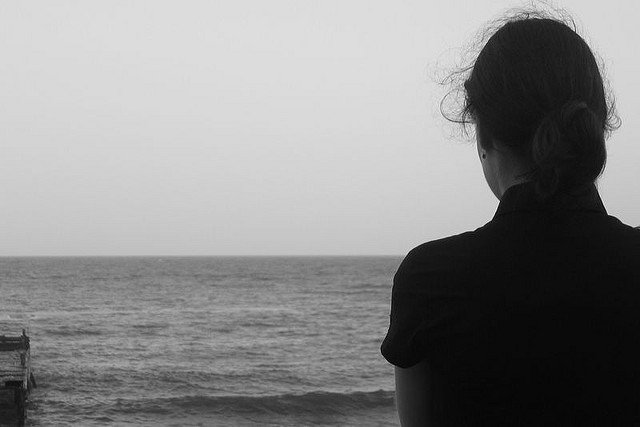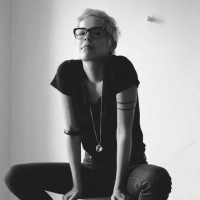
It was 12 days after my stem cell transplant and I was finally out of the hospital.
Waiting in the outpatient clinic for my first weekly check-up, I noticed a lean and pretty girl about my age sitting across from me, reading. She had a short pixie cut and adorable clothes. If it weren’t for her bracelet, I would not have known she was a patient. I listened and watched as she sent her husband out to get some Starbucks, and I caught the front of her book: Anne Lamott.
I was feeling pretty lucid that day, considering I had just undergone months of nearly-annihilating chemotherapy. I suppose I was just so happy to finally be out of the white box I’d spent the past two months in, and my throat sores had subsided considerably, so I could eat and drink again. I felt an impetus to talk to this girl, so I told her that I loved Anne Lamott. She told me she was in for her one year check-up, post-transplant.
I couldn’t believe my eyes. She looked incredible. She was glowing.
She laughed as she told me she was a middle school teacher, and that sometimes the kids ask her about the scars on her chest. She told me I looked pretty good for only being 12 days out; she was still in a drugged haze around then.
Then she said: “It gets a lot worse before it gets better. But it is so worth it. Just keep going, soul sister.”
My heart froze for a second as my brain processed her words. How could she have possibly known? From the day I was diagnosed, one specific line from Rainer Maria Rilke’s “Go to the Limits of Your Longing” had become my life mantra:
“Let everything happen to you: beauty and terror. Just keep going. No feeling is final.”
Just keep going, she said. Just keep going.
It meant so much to me to see her, looking healthy and happy and strong— one year away from where I was. At the time, I couldn’t imagine myself being in her place. I was still a complete mess, so caught up in dealing with the aftermath of this deadly treatment that I couldn’t even envision a time when cancer wouldn’t be my entire life.
And I hadn’t really started the arduous journey of dealing with everything that cancer disrupts or takes away. I felt its immediate effect, of course, the day I was told I had Leukemia. I was ripped out of my life and flung onto a single-lane fast track labeled C-A-N-C-E-R.
It changed everything.
In the beginning, I felt strong and capable of beating this thing because there wasn’t another option. It was life or death, and I had to fight. But later, when the solitude and mental exhaustion took hold I couldn’t make jokes anymore. Winter and depression drove me close to losing my mind or taking my own life.
I couldn’t see outside of it. There were nights I didn’t think I would actually make it. My mandated yearlong quarantine from the world to allow my new immune system to grow was absolutely crushing me. I believed it was possible to literally cry myself to death.
Even now that I’m able to enter the world, I feel an invisible handicap. A depression that won’t lift and is incredibly difficult to carry in a community that believes cancer ends with remission. It doesn’t.
It’s not their fault. Someone who hasn’t experienced a life-threatening disease may not be aware that it doesn’t “clear up” like a cold and then you’re back on your feet again in a jaunt. My journey with cancer didn’t end when I went into remission. I went into remission two weeks before my transplant. From where I stand now, I see that almost as the beginning, rather than the end.
They said cancer would take five years out of my life. It began when I was almost 25 and now I find myself suddenly 27, with not much to show for it besides my atrophied and contracted muscles and debilitating depression. Three more years…of this?
And yet even so, I’m here. Somehow I have survived this long. And I believe it’s a testament to the human imagination and endurance. Trauma leaves no one untouched in this life. We all get blindsided, crushed, derailed. But distress and suffering are where our true humanness is put to the test. It is during these times that the resilient human spirit can truly prove itself.
I remember thinking so often in my solitude (which for an extrovert like me, was a living hell), that so many human beings before me have endured hardships they didn’t think were possible to outlive. And I won’t be the last. I saw myself standing—or lying on the couch as it usually was—alongside so many people who persevered against ridiculous odds: who endured horrifying situations that weathered and wrung them out to the point of utter despair. “The dark night of the soul”, as so many have described it since St. John of the Cross in the 16th century.
We can all relate—hard is hard. It doesn’t matter what the situation is, there really isn’t a hierarchy of what causes “the most emotional trauma.” A five year old who is crying because she wants ice cream and a 25 year old who is crying because death is close by—who’s to say which emotion is more extreme? The situations differ, and of course as we mature we develop a deeper understanding, but hard is hard.
On my stronger days, I tell myself: “You’re so close now that you might as well finish this thing.” But some days it feels like it can’t end.
Surprisingly though, in some ways I find I don’t want it to end. What I mean is this: there are some changes to my perspective on the world and living that I don’t want to lose. I don’t want to forget how I feel being alive now, in this moment. After experiencing my own mortality, fragility, beauty and terror all together, I want to live differently.
I knew this experience would change me, but I’m still learning what that means. I’m figuring out who I am now. Trauma changes us. We find ourselves struggling to discover that lasting part of who we are, the part that outlives these circumstances.
So I’m trying to claim that bravery again, trying to find ways to celebrate and live out joy even if I don’t feel like doing it 100 percent. I am trying to discover how to be more grateful, more peaceful and more mindful. And more thankful for the people responsible for my still being here.
Cancer makes me aspire to be unafraid of the dumb sh*t that’s not actually scary. Life is fragile and life is terminal—for all of us.
So ask him for his number! Fly to Edinburgh! Start that new job! Make messy art! Take that dance class!
Apologize. Forgive. Take risks. Ask questions. Do things. Choose freedom. Choose Love.
The effects of cancer have outlived the cancer. And it’s a mixed bag, I must say. But I am, in this moment, trying to focus on the constructive elements in my life: the ways in which I am changed for the better. I am incredibly lucky to be able to do that right now, and perhaps tomorrow will not even look quite as bright. But life won’t stop being hard after this is over—if it’s ever over.
When I was young I always wondered when I would grow old enough to stop making mistakes. Now I realize that it does not work this way. Challenges will always arise and life will sink down to the watery mundane tasks if we let it. I want to remember this feeling of freedom from fear, and to be able to call upon it when I hit a wall, which I inevitably will.
So we need to keep finding ways to live and love better. Again and again, I turn to the words of the poet-saint Rilke: “Let everything happen to you: beauty and terror. Just keep going. No feeling is final.”
And while terror is completely real and I try to accept it as a part of life, panic attacks aren’t the highlight of my recent weeks. But as Rumi, another poet-saint, once said, “Be grateful for whoever comes, because each has been sent as a guide from beyond.” I want to believe in this kind of life, radical as it may seem. We have an unknown number of days, but we have a thousand choices in each one of them.
Because true strength is not being happy all the time, not even living through the hard times. It is the greater ability to claim our humanness as a constant ebb and flow of circumstances, and acknowledge all of them as true. Living each feeling fully in the moment, recognizing its realness and acknowledging that it does get a lot worse before it gets better.
But we can rely on the words of those who came before us: “It is so worth it. Just keep going, soul sister.”
So, to the girl in the waiting room: thank you for saying those precious words to me. I needed them then, and I still do now.
And to the other girl in the waiting room: you did it.
Two years down. One hundred more to go.
“…for what I could say about your tendency to doubt or about your inability to bring your outer and inner lives into harmony or about all the other things that oppress you—is just what I have already said: just the wish that you may find in yourself enough patience to endure and enough simplicity to have faith; that you may gain more and more confidence in what is difficult and in your solitude among other people. And as for the rest, let life happen to you. Believe me: life is in the right, always.” ~ Rainer Maria Rilke, “Letters to a Young Poet.”
Relephant read:
Hey Cancer: You’re an A**hole. {Warning: Adult Language}
Author: Bekah Jordan
Editor: Nicole Cameron
Image: Rooslan/Flickr






Read 0 comments and reply